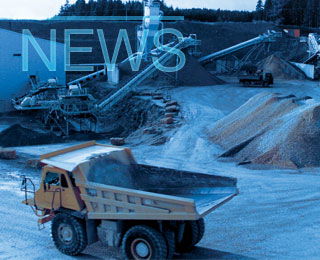The Competition Commission (CC) in the UK has said it is looking to invigorate competition in the British cement market by opening the way for a new independent producer.
As well as provisionally requiring Lafarge Tarmac to sell a cement plant (and accompanying ready mix concrete plants if necessary) to facilitate entry of this new producer, the CC is also proposing to limit the flow of information and data between cement producers, it said in a statement released today. Additionally, the CC is looking to increase competition in the supply chain for GGBS by ordering the sale of suitable production facilities. This remedy is subject to further consultation on the GGBS market, the CC noted.
The regulator's latest proposals are part of its investigation into Britain's cement industry which found in May a lack of competition. Professor Martin Cave, CC Deputy Chairman and Chairman of the Inquiry Group, said: “The best way to disturb the balance of a market where producers have focused on retaining their respective market shares rather than competing is to create the opportunity for a major new entrant.
“Being able to buy a cement plant—and a number of accompanying ready-mix plants if necessary—will give the new producer a foothold in the GB cement markets and will increase the number of GB cement producers, thereby disrupting the established patterns in these markets. “In addition to this, we will tackle the channels which facilitate the flow of information between the GB cement producers, such as price announcement letters and industry data. For a long time, these channels have given producers too much awareness of how their counterparts are performing and their future pricing strategy.
A summary of the remedies is as follows:
• Lafarge Tarmac should be required to choose between divesting either its Cauldon or Tunstead cement plant. The purchaser of the divested cement plant should be able to acquire a limited number of ready-mix plants from Lafarge Tarmac subject to the purchaser’s total internal cementitious requirement being capped at 15 per cent of the acquired cement production capacity. The buyer would have to be approved by the CC and not be one of the GB’s existing cement producers
• Restrictions on the publication of GB cement market data. Data currently published by the Minerals Products Association (MPA) and the Department for Business, Innovation & Skills should be delayed by no less than three months from the time period to which it refers before it can be made public. GB cement producers will also be prohibited (with a small number of specific exceptions) from providing their sales and production data to any other private sector organisation.
• GB cement suppliers will be prohibited from sending generic price announcement letters to their customers. Instead, they should send letters that are specific and relevant to the customers receiving them.
• Subject to further consultation on the GGBS supply chain, Hanson should divest two of its GGBS production facilities (GGBS plants) and Lafarge Tarmac should divest two of its GBS production facilities (GBS plants), again to a suitable purchaser approved by the CC but not to another GB cement producer.
There are five major producers of heavy building materials in the UK: Aggregate Industries, Cemex, Hanson, HCM and Lafarge Tarmac. HCM is a new firm established in January 2013 after it bought cement, aggregates and ready-mix assets which the CC had required Anglo American (the owner of Tarmac) and Lafarge to divest following an inquiry into the Anglo American/Lafarge joint venture last year. Aggregate Industries does not produce cement in the UK but all five have significant readymix operations.
Before publishing its final decisions on 17 January 2014, the CC will wait for responses to its proposals.
